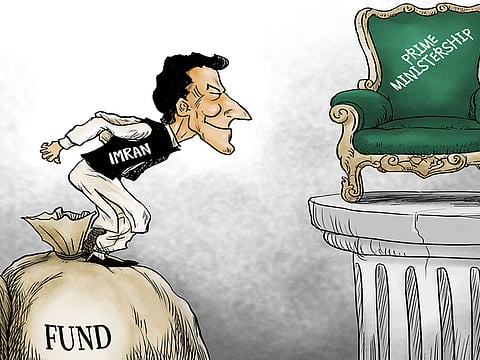Imran’s best shot at power in Pakistan
Move to welcome prominent defectors from rival parties has enhanced his political strength and brought huge funding — key ingredients to win elections

Imran Khan wants to be the next prime minister of Pakistan, but with the general election a month away he is caught in a catch-22 situation. To win, he has no choice but to allot most of the electoral seats to defectors from other political parties because they know how to get elected. At the same time, Imran cannot risk losing his long-standing loyal supporters who have started criticising him for overlooking their claims to be candidates. They are upset that their leader ditched them by preferring ‘opportunists’.
The 65-year-old charismatic political leader is fully aware that this is his best chance. It is now or never. This reality must have prompted him to take a tough decision even at the risk of alienating his party men.
Imran’s party, the Pakistan Tehreek-e-Insaf (PTI), has always attracted enthusiastic youngsters. But of late it has begun to look like a party of defectors, mainly from Nawaz Sharif’s PML-N and the Pakistan Peoples Party (PPP). Many are known to be corrupt, but Imran welcomed them because they can win.
The decision has sparked controversy within his party and created a dilemma among his voters: whether to vote or not for the new arrivals who were their rivals. For years, they have been campaigning against these corrupt politicians who are now part of their party. For some, it is a clear violation of Imran’s avowed motto to ‘fight against corruption and the corrupt’.
Imran’s move to accept the defectors may have far-reaching consequences — many of his loyalists may abstain from voting. But I believe Imran has taken the right decision: His party supporters cannot win enough seats to make him prime minister, and we have seen this in the past elections. He desperately needs ‘influential’ politicians to carry him to power.
Cricketer-turned-social-worker-turned politician, Imran set up his political party Pakistan Tehreek-e-Insaf (Pakistan Movement for Justice) in 1996. It was the year he opened his healthcare facility — Shaukat Khanum Memorial Trust Cancer Hospital in Lahore with generous funding from people in Pakistan and abroad. The hospital earned Imran massive respect from Pakistanis.
But his political party turned out to be a damp squib. Imran was regularly mocked as the party was unable to make any significant progress. He miserably failed in the 1997 elections, unable to win a single seat. Even the support from his socialite British wife Jemima Goldsmith during elections went in vain. People didn’t take Imran seriously, and Nawaz Sharif coasted to a landslide victory with a two-thirds majority. Imran did not give up. He pitched his party in 2002 general elections conducted by the then military ruler General Pervez Musharraf. The results were again very disappointing. He won his seat, but all his candidates were humiliated. The setback was particularly galling since the two most influential political leaders — the late Benazir Bhutto and Nawaz Sharif — were living in exile. The rout was attributed to the lack of heavyweights in the party ranks and paucity of funds to run election campaigns.
He boycotted the 2008 general election fully aware that his party’s chances were slim after both Nawaz Sharif and Benazir Bhutto were allowed to return under the national reconciliation ordinance (NRO) to participate in politics. Bhutto was assassinated in December 2007 during the election campaign, and her party went on to win the elections.
Dogged innings
Imran was quick to learn from his failures. He realised that he needed stalwarts to win elections. So he swallowed his pride and changed his ‘stubborn’ stance against defectors. His strategy to welcome prominent politicians from the PPP and PML-N paid off handsomely. The arrival of senior politicians not only brought political strength but also paved the way for generous funding — key ingredients to win elections in Pakistan. And the results followed.
The PTI made a major breakthrough in the 2013 elections and emerged the second largest party by national votes, gained the third largest number of seats in the national assembly and also formed the government in the Khyber Pakhtunkhwa province. None of this was enough to mount a challenge for power at the national level.
Imran has so far played a long and dogged innings, but he could not lead his team to victory: A victory that would elevate him to the prime ministership. Now, the chance has come. The disqualification of Nawaz Sharif as prime minister and a ban that prevented him from taking part in politics has changed the outlook dramatically.
Dogged by complacency and corruption, PPP is no longer a major national force, and they have almost been wiped out in the largest Punjab province. PML-N is facing crisis following its leader’s ouster.
The Pakistan army’s perceived support, the absence of Sharif and a large number of defections offer Imran the best opportunity to surprise the world. There is unlikely to be a more favourable situation.
Imran should no longer be seen as a former cricket hero. He is now a mature politician, and his political struggles can pave the way for a corruption-free society. All he needs is to convince people to vote for his party.



